On 16th October, Dr Emily Arden-Close, Senior Lecturer in Psychology, presented to Santander Group about how they can help problem gamblers. This was based on research she had conducted exploring ex-problem and social gamblers’ experiences of gambling and perceptions of EROGamb, technology developed by the Responsible Online Gambling Research Team for managing responsible online gambling.
The presentation generated a lot of discussion, and is expected to lead Santander Group taking an active role in developing policy to enable early identification of problem gamblers.
Category / Research communication
Dr Nasiru Taura – Keynote speaker at the Africa Logistics Conference
Digital innovations of the future in the field of flying robotics and drones technology are competing over the African Airspace. Few examples include: The UPS, Zipline, & GAVI partnership to begin aerial transport of healthcare supplies in Rwanda; The AfroTech Spin off Red/Blue testing of cargo drones capable of covering distances of up to 80km (50 miles) as well as the Flying donkeys (robotic flying vehicle) to deliver cargo across Africa?
While it is clear that these companies could benefit from scale economies due to humanitarian/development issues in Africa and save lives, it is unclear how Africa could make the most of this opportunity. Dr Nasiru Taura of the Faculty of Management – Department of Marketing, Strategy, and Innovation – was invited as one of the few world-leading experts on digital entrepreneurship in Sub Saharan Africa – to be a guest speaker at the recently held 7th Africa Logistics Conference. The annual Africa Logistics Conference (ALC) brings together local and regional researchers, business leaders and professionals from humanitarian, government, donor, academic and private sectors to share knowledge on issues, trends, and opportunities related to supply chain networks in the context of humanitarian & development logistics in Africa. The event was held from 2nd to 3rd October 2019 in Nairobi, Kenya.
Dr Taura draws from his research and professional practice expertise across a range of his publications on digital entrepreneurship to reflect on issues such as:
- why Africa on one hand and drones/robotics companies on the other needs each other?;
- why the 4th industrial revolution presents different sets of opportunities for actualizing African dreams?.
Dr Taura argues that Africa can become more prosperous by taking an active, instead of passive, role to co-create/co-produce body of knowledge that could underpin the development of the said futuristic technologies. However, he asserts that African governments need to engage in globalisation, improved absorptive capacity, & knowledge mapping of the humanitarian/development supply chains to be successful.
Should you be interested in Dr Taura’s work please see some of the favorites below or get in touch via email:
1) The digital entrepreneurship in Sub Saharan Africa (2019);
2) Accelerating Tech-enabled Entrepreneurship in Sub- Saharan Africa: A two-sector assessment – work presented in 20th Annual International Academy of African Business and Development (IAABD) held at Dar es Salaam, Tanzania (May 2019);
3) Feature in the Conversation Africa;
4) A recent paper titled ‘Intra-cluster knowledge exchange and frequency of product innovation in a digital cluster’ published in 3* (ABS ranked) Journal of Small Business Management.
Doctoral College Newsletter | October 2019
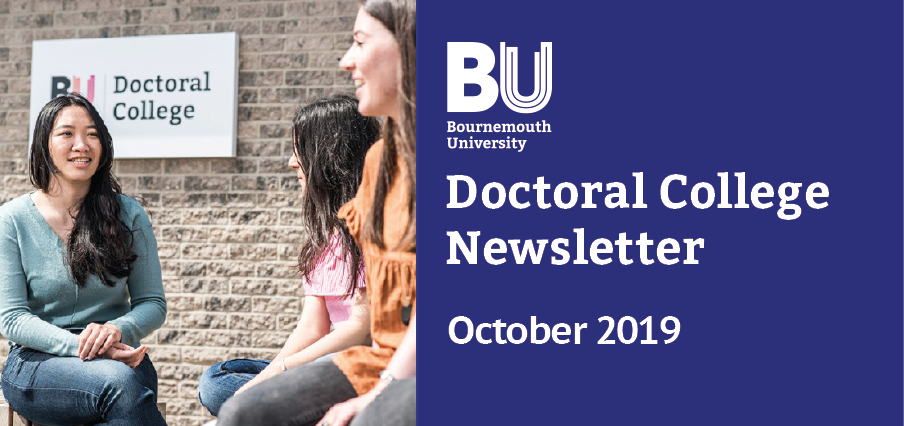
The Doctoral College Newsletter provides termly information and updates to all those involved with postgraduate research at BU. The latest edition is now available to download here. Click on the web-links provided to learn more about the news, events and opportunities that may interest you.
If you would like to make a contribution to future newsletters, please contact the Doctoral College.
The 11th Annual Postgraduate Research Conference
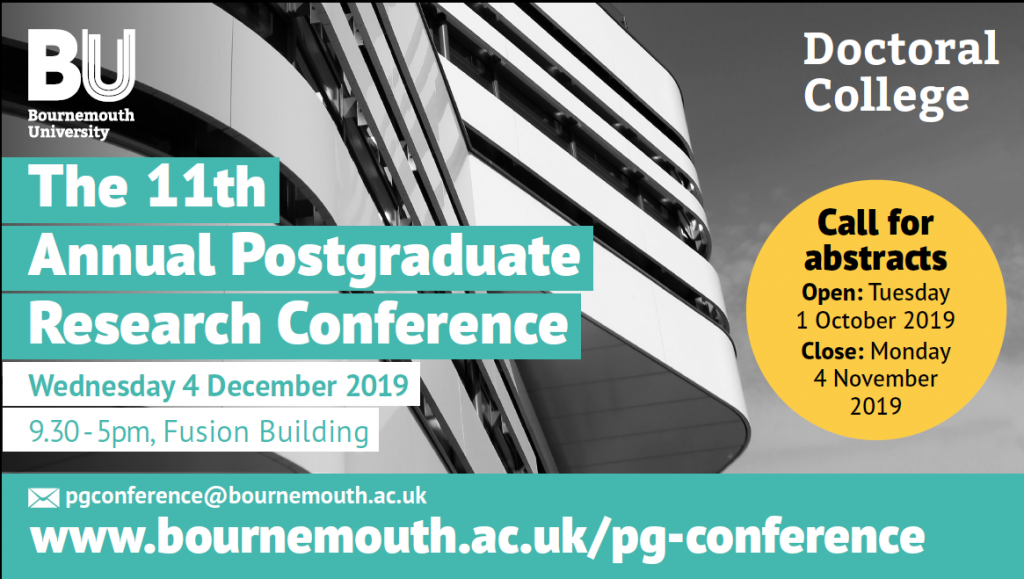
More pilots please!
“More pilots please!” is not a call from British Airways, Ryanair or the Royal Air Force. No, it a reminder to students to do more piloting in their postgraduate research projects. Between us we have read many (draft) theses and examined over 60 PhD theses external to Bournemouth University, and it is clear to us that many students do not do enough pre-testing or piloting of their research instruments. Perhaps they did some piloting or feasibility work for their projects but don’t write enough about it. Or they present some feasibility or piloting in their thesis but haven’t added references to methodological texts.
 The term ‘pilot studies’ refers to mini versions of a full-scale study (also called ‘feasibility’ studies), as well as the specific pre-testing of a particular research instruments such as data collection tools (i.e. questionnaire or semi-structured interview schedule). Pilot studies are key to good study design [1-6]. Conducting a pilot study does not guarantee success in the main study, but it does increase the likelihood of success. Pilot studies have several of important functions in research design and can provide valuable insights to the researcher on both tools and research processes. We think it is telling that our most cited paper on Google Scholar is not one of our papers reporting research findings but a methods paper highlighting the importance of pilot studies [2].
The term ‘pilot studies’ refers to mini versions of a full-scale study (also called ‘feasibility’ studies), as well as the specific pre-testing of a particular research instruments such as data collection tools (i.e. questionnaire or semi-structured interview schedule). Pilot studies are key to good study design [1-6]. Conducting a pilot study does not guarantee success in the main study, but it does increase the likelihood of success. Pilot studies have several of important functions in research design and can provide valuable insights to the researcher on both tools and research processes. We think it is telling that our most cited paper on Google Scholar is not one of our papers reporting research findings but a methods paper highlighting the importance of pilot studies [2].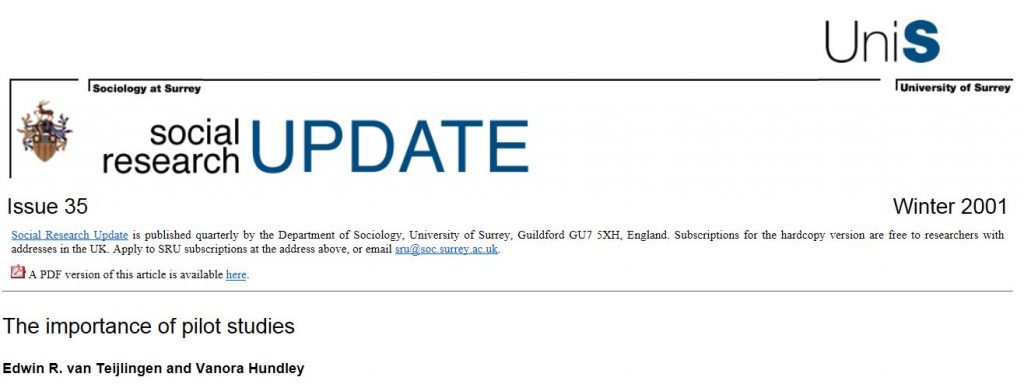
Professors Vanora Hundley & Edwin van Teijlingen
CMMPH
References:
- van Teijlingen E, Rennie, AM., Hundley, V, Graham, W. (2001) The importance of conducting & reporting pilot studies: example of Scottish Births Survey, Journal of Advanced Nursing, 34: 289-95.
- van Teijlingen E, Hundley, V. (2001) The importance of pilot studies, Social Research Update Issue 35, (Editor N. Gilbert), Guildford: University of Surrey. Web: http://www.soc.surrey.ac.uk/sru/SRU35.html
- van Teijlingen E, Hundley, V.(2002) ‘The importance of pilot studies’ Nursing Standard 16(40): 33-36. Web: www.nursing-standard.co.uk/archives/vol16-40/pdfs/vol16w40p3336.pdf
- Hundley, V., van Teijlingen E, (2002) The role of pilot studies in midwifery research RCM Midwives Journal 5(11): 372-74.
- van Teijlingen E, Hundley, V. (2003) Pilot study, In: Lewis-Beck, M., Bryman, A. & Liao, T. (eds.) Encyclopaedia of Social Science Research Methods, Vol. 2, Orego, Sage: 823-24.
- van Teijlingen E, Hundley, V. (2005) Pilot studies in family planning & reproductive health care, Journal of Family Planning & Reproductive Health Care 31(3): 219-21.
Professor Sangeeta Khorana at the 2019 South West Economic Forum
Professor Sangeeta Khorana has been invited to speak at the 2019 South West Economic Forum. The event, scheduled for 10 October 2019 in Evershot Dorset, will focus on how local businesses are driving the local economy.
Professor Khorana will provide an update on the revised tariff schedule and state of play of current trade arrangements after Brexit to local businesses.
Other distinguished speakers include: Rebecca Stevens MBE (the first British woman to climb Mt Everest and the Seven Summits), Alistair Handyside MBE (Higher Wiscombe Eco Holidays Cottages), Nick Palmer (Managing Director and majority shareholder of EPS Services & Tooling Ltd) and Rubert Hollaway (founder of Conker’s signature Dorset Dry gin).
Forthcoming RKEDF Research Training Events

We have some great events coming up over the next few weeks to help support you in your research activities :
October
| Tuesday 15th October | RKEDF: Good Clinical Practice ‘Lite’ |
| Wednesday 16th October | RKEDF: Getting started in public engagement with research |
| Thursday 17th October | RKEDF: BRIAN: Building your staff profile |
| Monday 21st October | RKEDF: High Quality Public Engagement |
| Thursday 24th October | RKEDF: Overview of NIHR, CRNs and NIHR portfolio |
| Thursday 24th October | GCRF Best Practice Workshop |
| Wednesday 30th October | RDS Academic and Researcher Induction Event |
November
| Tuesday 5th November | RKEDF: Clinical Research- documentation and filing |
| Wednesday 6th November | RKEDF: Research Outputs – Writing Day |
| Tuesday 19th November | RKEDF: Impact Planning Session |
| Wednesday 13th November | RKEDF: EndNote Desktop for Managing References and Writing for Publication |
| Tuesday 19th November | RKEDF: Advanced Literature Search Techniques |
| Tuesday 19th November | RKEDF: Working with Industry |
| Tuesday 19th November | RKEDF: Building Evidence for REF Impact Case Studies |
| Wednesday 20th November | RKEDF: Leverhulme Prize Drafting Workshop |
| Wednesday 20th November | RKEDF: Inspirational Impact Journey |
| Wednesday 20th November | Leverhulme Trust visit to BU |
| Tuesday 26th November | RKEDF: Evaluation: Developing your approach |
| Wednesday 27th November | RKEDF: Measuring the Impact of Your Research with Advanced Citation Tools. |
You can see all the Organisational Development and RKEDF events in one place on the handy calendar of events.
Please note that all sessions are now targeted, so look closely at the event page to ensure that the event is suitable for you. In addition, RKEDF events now require the approval of your Head of Department (or other nominated approver). Please follow the instructions given on the event page and the template email for you to initiate the booking request.
If you have any queries, please get in touch!
Media industries haemorrhage experience
Richard Wallis writes:
A new study of Media Production graduates’ long-term career trajectories exposes industry’s high levels of wastage.
Like consumable goods that come labelled with a ‘best before’ date, it seems that media careers may also come with a limited shelf-life. Research published this week suggests that media industries have a problem with long-term retention. The study is one of a series we have undertaken to investigate the career trajectories of our students. The more that we understand about their post-BU working lives, the better we can prepare them for the world of work, and the more effectively we can be the critical friend providing much-needed thought-leadership for industry.
The study took as its focus the BA Media Production (BAMP) ‘Class of ‘95’: the cohort of Media Production students who arrived at Bournemouth at the point at which the institution received its university status. These BU first-generation graduates are now in mid-career, and their working lives have spanned a period of unprecedented upheaval within the industries that they aspired to work in. The study has exposed a feature of media work that has wider implications for the way media industries operate.
We have long known that media work is not for the faint-of-heart, and that the transition from University into work can be extremely challenging. Many previous studies (including our own) have attempted to examine some of the difficulties graduates face, particularly during the early stages of their careers. In this study we set out to understand the way in which the demands of media work are experienced through the prism of age, and life stage. We were able to interview a sample of 28 of these graduates: just over one third of the ’95 cohort.
What we learned surprised us. We had thought that the major challenges of media work were those experienced in early career. What we found caused us to question this presumption. Although we confirmed much of what previous studies have highlighted about early careers, sustaining the relentless pressures of such work over the longer-term transpired to be just as significant a problem. Many of our contributors talked fondly, and sometimes passionately, about work they had found to be enormously rewarding, but this ‘labour of love’ had become increasingly difficult to sustain over time. The rate of attrition by mid-career is striking. This presents an important challenge to the media industries. Whilst they become increasingly reliant on well-educated, highly motivated neophytes who are inexpensive, willing, and able to be flexible and self-exploiting, they are heamorrhaging experience, honed skills, and organizational memory. This is a development that, ultimately, cannot be for the good of the individual worker, the media organisations in which they work, or the Creative Industries as a sector.
See: Wallis, R., van Raalte, C. and Allegrini, S. (2019) The ‘shelf-life’ of a media career: a study of the long-term career narratives of media graduates. Creative Industries Journal https://doi.org/10.1080/17510694.2019.1664099
Engaging with the media – scary or essential?
Wonkhe have an excellent new blog out: Why aren’t there more academic experts in the media?
Written by Justin Shaw, a HE Consultant at Communications Management, it is part of his campaign to ensure the academic voice is heard. He would like to see a proliferation in colleagues sharing their evidence-based expertise both with policy makers and the population.
For the blog Justin interviewed 30 of the most prolific ‘media active’ academics to understand the enablers and barriers in taking up media opportunities and what they would say to media-hesitant colleagues to help them take the next step.
Here are some excerpts – but do make time to read the full (short) blog:
The belief that it is far better to anticipate, lead, and take control of media opportunities (rather than suffer in response or serve as a moaning bystander) is one of the main findings that has emerged from interviews with some of the UK’s most committed “media active” academics.
A significant finding is that these academic media advocates simply now regard working with journalists as part of the job. Not only that, but they also stress that it is now (more than ever) a duty and an obligation – especially in an era of growing media input from the subjective and the “ill-informed” (most commonly defined as: shoot-from-the-hip politicians or rent-a-quote personalities drawn from reality TV shows).
While their journey as a go-to media expert has been challenging, and certainly there are some hard lessons to learn on the way, they say that we have now come to a point where academics just have to be bolder, must stand-up and project their knowledge, their evidence, their experience, and they must simply just seize the initiative. Without taking this stand then academics will be crowded out as the voices of reason
“So often politicians and policy-makers present things as facts, but there’s no evidence base for this, so I feel obliged to point out that there is a big body of work and evidence that isn’t being drawn upon, just being the critical voice to say “have you thought about the implications of what you are saying?”. The value of it is that it allows the public to have a more rounded view of the situation, so they can make their own minds up, based on evidence.”
The blog goes on to explain that the skills of an academic researcher and lecturer are the best type of skills to prepare for media engagement. So in short, you’re already got it in the bag.
The blog concluded by considering how the professional services teams around the academic, such as BU’s Press Office, BU’s RDS Impact and Research Comms colleagues, and BU’s Policy Team, can be useful additional support mechanisms – both for media experienced and novice colleagues. Get in touch if you’d like more support or to discuss how you could connect with the media or parliament.
BRIAN: Building your staff profile
If you are new to BU, or have not updated your staff profile for a while, then this short course is for you!

BRIAN (Bournemouth Research Information And Networking) is BU’s publication management system.
Learn how to use BRIAN to manage your research outputs, biography, academic group, memberships, website and social media links, plus many more options.
Thursday 17th October 16:00 – 17:00 at the Talbot Campus
Information input to BRIAN will be displayed in the BU staff profile web pages and can be imported into staff academic profiles (SAP) which is great for networking. BRIAN enables a single point of data entry which will enable research information to be used in multiple places.
Aims and objectives:
- Know how to login to BRIAN
- How to update publications and professional activities
- How to upload full text articles to BURO
- How to make your Staff Profile accessible to people beyond academia
If you can’t make the session above, there will be another held on Thursday 19th May, from 10:00 – 11:00 also at the Talbot Campus.
For more details and to book, see here.
The 11th Annual Postgraduate Research Conference
Attending the conference is a great opportunity to engage with postgraduate researchers and find out more about the exciting and fascinating research happening across BU.
Abstracts are invited for postgraduate researchers to take part in the live research exhibition, present via oral or poster presentation, or for a speed challenge to submit to the rapid research session which will close this year’s conference.
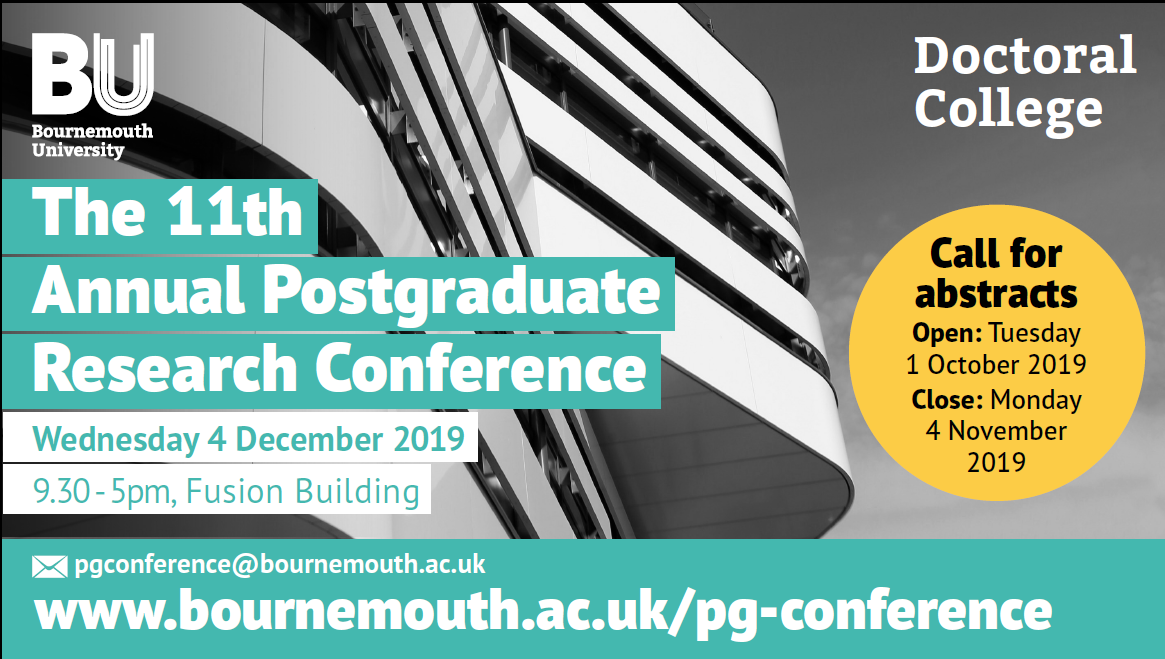
Research training and events coming up soon
We have some great events coming up over the next few weeks to help support you in your research activities. Unless otherwise specified, please follow the link for more info and to book.
| Wednesday 25th September | ACORN Information Workshop, F306, 14:00 – 15:00 , contact acorn@bournemouth.ac.uk to book |
| Tuesday 1st October | RKEDF: Introduction to Impact (FMC) |
| Tuesday 1st October | RKEDF: Impact and Funding Bids |
| Tuesday 8th October | RKEDF: Research Ethics @ BU |
| Tuesday 8th October | RKEDF: Getting started on applying for research funding |
| Wednesday 9th October | Networking meeting for Early Career Researchers, contact RKEDF@bournemouth.ac.uk for more info |
| Tuesday 15th October | RKEDF: Good Clinical Practice ‘Lite’ |
| Wednesday 16th October | RKEDF: Getting started in public engagement with research |
| Thursday 17th October | RKEDF: BRIAN: Building your staff profile |
| Monday 21st October | RKEDF: High Quality Public Engagement |
| Monday 21st October | ACORN Information Workshop, Create Lecture Theatre, 15:00 – 17:00, contact acorn@bournemouth.ac.uk to book |
| Thursday 24th October | RKEDF: Overview of NIHR, CRNs and NIHR portfolio |
| Wednesday 30th October | RDS Academic and Researcher Induction Event |
These events are delivered as part of the overarching Research and Knowledge Exchange Development Framework – RKEDF. On the RKEDF intranet page, training events have been grouped around your needs, so if, for example, you are an Early Career Researcher or need to know about external funding, you can click on the link to find a tailored list of all the RKEDF sessions that may assist you. You can also find related events by using the link on each session’s page.
You can also see all the Organisational Development and RKEDF events in one place on the handy calendar of events.
Please note that all sessions are now targeted, so look closely at the event page to ensure that the event is suitable for you. In addition, many RKEDF events now require the approval of your Head of Department (or other nominated approver). Please follow the instructions given on the event page and the template email for you to initiate the booking request.
If you have any queries, please get in touch!
BU articles on academic writing & publishing
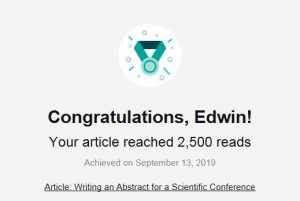 Last Friday ResearchGate informed us that ‘Writing an Abstract for a Scientific Conference’ [1] published by three Bournemouth University (BU) scholars (Prof. Vanora Hundley, Dr. Bibha Sinkhada and Prof. Edwin van Teijlingen and a BU Visiting Professor (Prof. Padam Simkhada) had reached 2,500 reads.
Last Friday ResearchGate informed us that ‘Writing an Abstract for a Scientific Conference’ [1] published by three Bournemouth University (BU) scholars (Prof. Vanora Hundley, Dr. Bibha Sinkhada and Prof. Edwin van Teijlingen and a BU Visiting Professor (Prof. Padam Simkhada) had reached 2,500 reads.  This paper is one of a series of articles BU academics have published on several aspects of academic writing and scientific publishing. The range of publications includes issue such as: predatory publishers, authors earning from copyright; finding the best title for your paper, and issues of authorship [2-13]. These are great resources for budding academic writers, especially as nearly are Open Access publications and hence freely available across the world.
This paper is one of a series of articles BU academics have published on several aspects of academic writing and scientific publishing. The range of publications includes issue such as: predatory publishers, authors earning from copyright; finding the best title for your paper, and issues of authorship [2-13]. These are great resources for budding academic writers, especially as nearly are Open Access publications and hence freely available across the world.
Other useful BU resources include the work by Dr. Kip Jones, such as his blogs on Organising & Writing a PhD thesis or his advice on Writing Blogs. Another great BU resource is the online publication by Dr. Miguel Moital, who wrote the e-book Writing Dissertations & Theses: What you should know but no one tells you, where he shares valuable practical information about the process of writing academic work, notably dissertations. The book starts with explaining the six criteria, expressed in the form of 6 ‘C’s, required to produce high quality dissertations: Confined, Corroborated, Critical, Coherent, Concise and Captivating. The e-book then goes on to share a range of ‘tips and tools’ which contribute to fulfilling the 6 Cs. 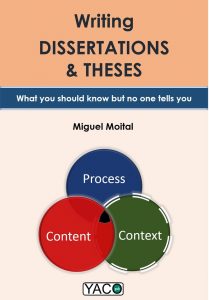
Moreover, it is also worth pointing out that there are some great web resources on writing and publishing produced by BU Library staff, for example on plagiarism; academic writing; or how to cite references.
Prof. Edwin van Teijlingen
Centre for Midwife
References
- Simkhada, P., van Teijlingen E., Hundley, V., Simkhada, BD. (2013) Writing an Abstract for a Scientific Conference, Kathmandu Univ Med J 11(3): 262-65. http://www.kumj.com.np/issue/43/262-265.pdf
- van Teijlingen, E, Hundley, V. (2002) Getting your paper to the right journal: a case study of an academic paper, J Advanced Nurs 37(6): 506-11.
- Pitchforth, E, Porter M, Teijlingen van E, Keenan Forrest, K. (2005) Writing up & presenting qualitative research in family planning & reproductive health care, J Fam Plann Reprod Health Care 31(2): 132-135.
- Kretschmer, M., Hardwick, P. (2007) Authors’ earnings from copyright and non-copyright sources: A survey of 25,000 British and German writers, Bournemouth: Bournemouth University, Centre for Intellectual Property Policy & Management.
- van Teijlingen, E, Simkhada, PP, Rizyal A (2012) Submitting a paper to an academic peer-reviewed journal, where to start? (Guest Editorial) Health Renaissance 10(1): 1-4.
- van Teijlingen, E, Simkhada. PP, Simkhada, B, Ireland J. (2012) The long & winding road to publication, Nepal J Epidemiol 2(4): 213-215 http://nepjol.info/index.php/NJE/article/view/7093/6388
- Hundley, V, van Teijlingen, E, Simkhada, P (2013) Academic authorship: who, why and in what order? Health Renaissance 11(2):98-101 www.healthrenaissance.org.np/uploads/Download/vol-11-2/Page_99_101_Editorial.pdf
- Simkhada P, van Teijlingen E, Hundley V. (2013) Writing an academic paper for publication, Health Renaissance 11(1):1-5. www.healthrenaissance.org.np/uploads/Pp_1_5_Guest_Editorial.pdf
- van Teijlingen, E., Ireland, J., Hundley, V., Simkhada, P., Sathian, B. (2014) Finding the right title for your article: Advice for academic authors, Nepal J Epidemiol 4(1): 344-347.
- van Teijlingen E., Hundley, V., Bick, D. (2014) Who should be an author on your academic paper? Midwifery 30: 385-386.
- Hall, J., Hundley, V., van Teijlingen, E. (2015) The journal editor: friend or foe? Women & Birth 28(2): e26-e29.
- Sathian, B., Simkhada, P., van Teijlingen, E., Roy, B, Banerjee, I. (2016) Grant writing for innovative medical research: Time to rethink. Med Sci 4(3):332-33.
- Pradhan, AK, van Teijlingen, ER. (2017) Predatory publishing: a great concern for authors, Med Sci 5(4): 43.
Public databases related to EU funding
 The European Commission maintains a large number of publicly available databases with details about Horizon 2020 and other EU projects. The UK Research Office (UKRO) have recently prepared a summary of sources where data related to both submitted and funded EU projects may be found; these may be useful for academics considering applying for EU funding and searching for experienced partners for future applications.
The European Commission maintains a large number of publicly available databases with details about Horizon 2020 and other EU projects. The UK Research Office (UKRO) have recently prepared a summary of sources where data related to both submitted and funded EU projects may be found; these may be useful for academics considering applying for EU funding and searching for experienced partners for future applications.
Horizon 2020 Dashboard – This is the most comprehensive and up-to-date of all databases provided by the Commission. It is very interactive and allows users to modify and export the relevant data in various formats. Since its launch on November 2017, the database has grown immensely.
UKRO maintains a dedicated website with information on how to best utilise available data (BU is UKRO subscriber – our academics have access to subscribers’ part of this website).
EU Open Data Portal (ODP) – In a way, the EUODP is the Dashboard’s predecessor and allows users to download various datasets in .xls and .csv formats. While it initially only included details of projects and organisations participating in H2020, it has been expanded in recent years and now includes details such as project deliverables, PIs in ERC projects and researchers in H2020 MSCA projects, which cannot be found on the H2020 Dashboard. Information about FP7 projects is also available.
 CORDIS – This database has been the main repository for EU research results since 1990s and includes information about projects funded under the current and past EU Framework Programmes (FP6, FP5, etc.). Apart from basic project data, it also includes information about project deliverables and summary reports, as well as project-related events.
CORDIS – This database has been the main repository for EU research results since 1990s and includes information about projects funded under the current and past EU Framework Programmes (FP6, FP5, etc.). Apart from basic project data, it also includes information about project deliverables and summary reports, as well as project-related events.
European Research Council’s (ERC) Funded Projects – This basic database provides generic information about ERC projects (including the PIs’ names) and allows searching by scheme (Starting Grant, Consolidator Grant, Advanced Grant, etc.), year and country of the host institution, which is also possible in other databases.
For more details, you may read full article on UKRO portal (login details required). If you have difficulties in accessing information on UKRO portal, feel free to contact Research Facilitator – International Ainar Blaudums.
Migration & health research in Middle East & Malaysia
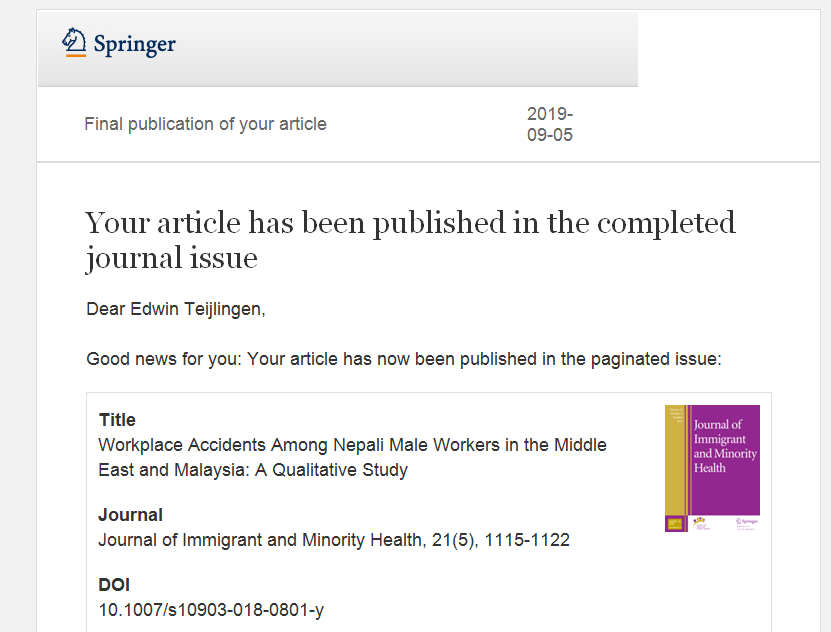 Yesterday the Journal of Immigrant and Minority Health published the final version of Dr. Pratik Adhikary’s paper ‘Workplace Accidents Among Nepali Male Workers in the Middle East and Malaysia: A Qualitative Study’ [1]. This is the fourth paper originating from Pratik’s Ph.D. research conducted in the Faculty of Health & Social Sciences, the first three papers appeared in the period 2011-2018 [2-4].
Yesterday the Journal of Immigrant and Minority Health published the final version of Dr. Pratik Adhikary’s paper ‘Workplace Accidents Among Nepali Male Workers in the Middle East and Malaysia: A Qualitative Study’ [1]. This is the fourth paper originating from Pratik’s Ph.D. research conducted in the Faculty of Health & Social Sciences, the first three papers appeared in the period 2011-2018 [2-4].
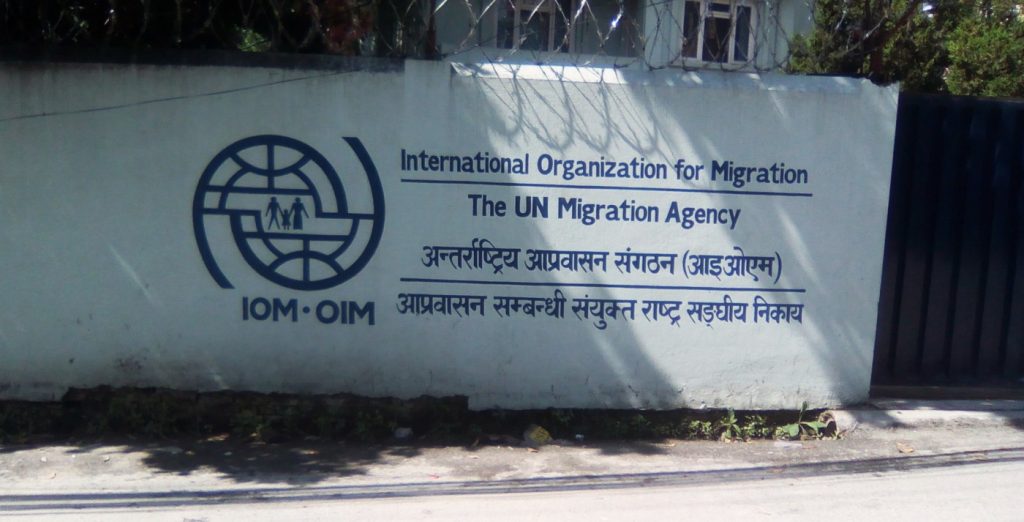 The paper highlights that many Nepali men work in the Middle East and Malaysia and media reports and anecdotal evidence suggests they are at a high risk of workplace-related accidents and injuries for male Nepali workers. Pratik’s Ph.D. study used face-to-face interviews to explore the personal experiences of twenty male Nepali migrants of unintentional injuries at their place of work. His study found that almost half of study participants experienced work-related accident abroad. The Participants suggested that the reasons behind this are not only health and safety at work but also poor communication, taking risks by workers themselves, and perceived work pressure. Some participants experienced serious incidents causing life-long disability, extreme and harrowing accounts of injury but received no support from their employer or host countries.
The paper highlights that many Nepali men work in the Middle East and Malaysia and media reports and anecdotal evidence suggests they are at a high risk of workplace-related accidents and injuries for male Nepali workers. Pratik’s Ph.D. study used face-to-face interviews to explore the personal experiences of twenty male Nepali migrants of unintentional injuries at their place of work. His study found that almost half of study participants experienced work-related accident abroad. The Participants suggested that the reasons behind this are not only health and safety at work but also poor communication, taking risks by workers themselves, and perceived work pressure. Some participants experienced serious incidents causing life-long disability, extreme and harrowing accounts of injury but received no support from their employer or host countries.
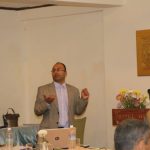 The paper concludes that Nepali migrant workers are at a high risk of occupational injuries owing to a number of interrelated factors poor health and safety at work, pressure of work, risk taking practices, language barriers, and their general work environment. Both the Government of Nepal and host countries need to be better policing existing policies; introduce better legislation where necessary; ensure universal health (insurance) coverage for labour migrants; and improve preventive measures to minimize the number and severity of accidents and injuries among migrant workers.
The paper concludes that Nepali migrant workers are at a high risk of occupational injuries owing to a number of interrelated factors poor health and safety at work, pressure of work, risk taking practices, language barriers, and their general work environment. Both the Government of Nepal and host countries need to be better policing existing policies; introduce better legislation where necessary; ensure universal health (insurance) coverage for labour migrants; and improve preventive measures to minimize the number and severity of accidents and injuries among migrant workers.
References:
- Adhikary P, van Teijlingen E., Keen S. (2019) Workplace accidents among Nepali male workers in the Middle East and Malaysia: A qualitative study, Journal of Immigrant & Minority Health 21(5): 1115–1122. https://link.springer.com/article/10.1007/s10903-018-0801-y
- Adhikary P., Keen S., van Teijlingen E (2011) Health Issues among Nepalese migrant workers in Middle East. Health Science Journal 5: 169-75. www.hsj.gr/volume5/issue3/532.pdf
- Adhikary, P, Sheppard, Z., Keen, S., van Teijlingen, E. (2017) Risky work: accidents among Nepalese migrant workers in Malaysia, Qatar & Saudi Arabia, Health Prospect 16(2): 3-10.
- Adhikary P, Sheppard, Z., Keen S., van Teijlingen E. (2018) Health and well-being of Nepalese migrant workers abroad, International Journal of Migration, Health & Social Care 14(1): 96-105. https://doi.org/10.1108/IJMHSC-12-2015-0052
Call for Presenters and Registration: Third Annual FMC Postgraduate Conference – Nov. 13th, 2019
We are excited to announce that the Third Annual FMC postgraduate conference will be hosted on 13th November 2019 at the Share Lecture Theatre in the Fusion Building on Talbot Campus. This will be a fantastic opportunity for all postgraduate researchers to showcase their excellent research to the faculty, as well as providing a great experience to present in a conference setting. There will be a chance for staff and student conducting postgraduate research to receive feedback from staff and peers.
We are happy to receive the following submissions from all FMC PGRs:
– 15 minute presentation
– 30 minute workshop
Additionally, first year postgraduate researchers have the option to present a 3- minute thesis, a shorter presentation with just one slide, to introduce their research topic to the faculty. This year there is also the option for postgraduates based elsewhere to present virtually (please be aware that you will be asked to make a back up recorded presentation in case of technical difficulties). We want the conference to be inclusive of all FMC postgraduates.
If you would like to present, please submit your abstract of no more than 250 words, presentation title, presentation format, and no more than 75 word bio to byang@bournemouth.ac.uk by 17 October 2019. You will be notified within one week of the deadline as to whether your presentation has been accepted.
If you are interested in attending the conference free registration can be completed here: https://fmcpgconference.eventbrite.co.uk
We look forward to receiving your abstracts and registration!
Alex, Bing, Evgeniya, Jo and Mel
Conference Organisers Postgraduate Researchers
Faculty for Media and Communication
Submission Checklist
O Presentation Title
O c. 250 word abstract
O Presentation Format
O c. 75 word biography
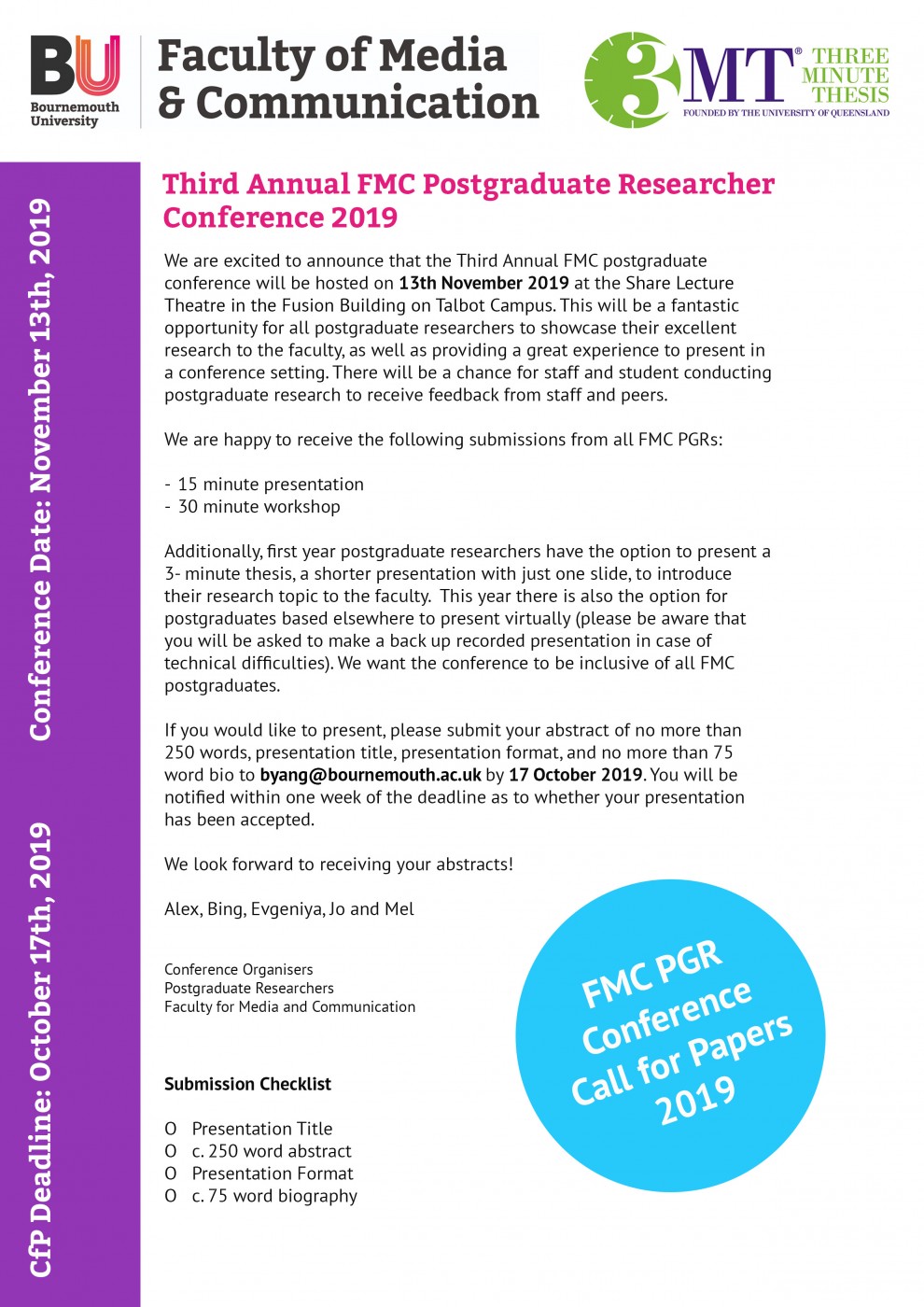
Update to HRA’s data transparency wording for Participant Information Sheets
Following the implementation of GDPR in May of this year, the Health Research Authority released transparency wording for use in Participant Information Sheets.
The recommended wording for data transparency has been updated following consultation with various stakeholders and public involvement and feedback on the initial published wording to provide a clearer more layered approach.
The user group developed a short summary text for the Participant Information Sheet which is supplemented by a generic leaflet. The text for both is now live on the HRA website.
What information should be used in my PI Sheet?
The HRA website section is here. Click on ‘Transparency wording for all sponsors’ – this will take you to this page which contains the information to be used.
To access the text to be used in preparing the leaflet to accompany your PI Sheet, click here. If you are on the HRA website section, the text appears once you click the heading ‘Template wording for generic information document’.
What does the revision in text mean for me?
- If you have already updated your information sheets with the previous wording, you do not need to do anything.
- The revised wording can be uses for new studies, but the HRA will accept the previous wording if you have already submitted your application or prepared your information sheet for submission.
- If you do wish to change your wording to the new text, please email Research Ethics so that your participating sites can be contacted.
If you have any queries or concerns please email Research Ethics.
Mentor + Media – a new app for professionals working with refugee youth
The “Media literacy for refugee youth” international project started in 2017 and its aim was to understand how unaccompanied minor refugees use digital technologies and social media. For this, the principal investigator of the project, Dr Annamária Neag, with the support of her mentor, Dr Richard Berger, carried out field work in Sweden, the Netherlands, Italy and the UK. A total of 56 unaccompanied refugee kids were interviewed, and some of them also took part in a digital ethnography phase. Moreover, in London, a group of young people joined the participatory action research phase of the research.
Although the first aim was to understand how these young people use smart phones and social media, the final goal was to create media education materials that can aid their integration into a new society. For understanding the young people’s media lives, Dr Neag also interviewed mentors, guardians and educators who helped her in how to shape these educational materials.
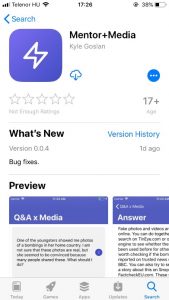

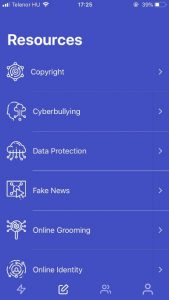
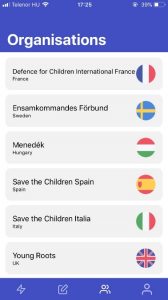
Based on the research findings, the team decided that the best course of action was to create an app that could aid the work of mentors and social workers who look after unaccompanied refugee children. With the help of Kyle Goslan, from Bournemouth University, this app is now freely available for iPhones from the AppStore. Those interested in the app should only do a quick search for Mentor + Media on the AppStore and install it from there.











 FHSS academics teaching in Nepal
FHSS academics teaching in Nepal New weight change BU paper
New weight change BU paper One week to go! | The 16th Annual Postgraduate Research Conference
One week to go! | The 16th Annual Postgraduate Research Conference Geography and Environmental Studies academics – would you like to get more involved in preparing our next REF submission?
Geography and Environmental Studies academics – would you like to get more involved in preparing our next REF submission? Congratulations to three former BU staff
Congratulations to three former BU staff MSCA Staff Exchanges 2024 Call – internal deadline
MSCA Staff Exchanges 2024 Call – internal deadline Applications are now open for 2025 ESRC Postdoctoral Fellowships!
Applications are now open for 2025 ESRC Postdoctoral Fellowships! Horizon Europe – ERC CoG and MSCA SE webinars
Horizon Europe – ERC CoG and MSCA SE webinars MaGMap: Mass Grave Mapping
MaGMap: Mass Grave Mapping ERC grants – series of webinars
ERC grants – series of webinars